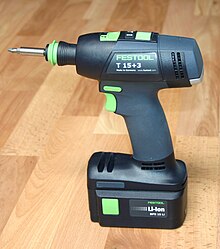Festool
| Festool
|
|
|---|---|
| legal form | GmbH |
| founding | 1925 / GmbH January 1, 2000 / GmbH & Co. KG August 10, 2012 / GmbH since August 7, 2014 |
| Seat | Wendlingen am Neckar |
| Number of employees | over 2,700 (as of 2017) |
| sales | 580 million euros (as of 2016) |
| Branch | Tools |
| Website | festool.de |
The Festool GmbH with headquarters in Wendlingen am Neckar is a manufacturer of electrical and pneumatic tools. The company was founded by Gottlieb Stoll and Albert Fezer in 1925 under the name Fezer & Stoll.
Companies
The tool division of Festo was spun off into the subsidiary Festo Tooltechnic GmbH & Co. in 1992 and separated from the group on January 1, 2000 and transferred to Festool GmbH.
The production site, which has been one of the winners of the “Factory of the Year” (2002, 2005 and 2008) and “Best Factory” (2011) competition, has been in Neidlingen since 1952 .
The company has an export quota of 76% and is present in 68 countries with its own subsidiaries in 25 countries.
Today Festool, together with Tanos and other companies and areas, is a brand of TTS Tooltechnic Systems AG & Co. KG.
Products
Festool produces a complete range of electric and compressed air tools for woodworkers , painters and car painters - from cordless drills to circular saws, jigsaws, pull and chop saws, milling machines, planers, grinders and polishers to special vacuum cleaners .
history
The company was founded by Albert Fe zer and Gottlieb Sto ll in 1925 in Esslingen. Festo specialized in the manufacture of woodworking machines and revolutionized the market with its portable circular saw AS-70 and the electric chain mortiser ZB 140. These machines enabled machine sawing and chiseling work on site, which was previously not possible. In 1933 Stoll took over the company shares from Fezer and continued to run the company under the name "Festo Maschinenfabrik Gottlieb Stoll".
In 1951 Festo developed the first "Rutscher" ( orbital sander ); it made surface processing much easier. In the 1950s, a new production site was built in Neidlingen, where production continues to this day. In the 1960s, Festo developed the first orbital sander with extraction, in response to the health risks involved in sanding component fillers based on epoxy resin.
In 1971 Gottlieb Stoll died and his sons Kurt and Wilfried took over management of the company. In addition to the power tool division, the Stoll brothers set up the Festo Pneumatics division. In the 1970s the company expanded internationally and sales offices were established in all European countries and worldwide. Ten years later, in the 1980s, the company decided to give up the stationary machine sector and concentrate on hand-held power tools and systems. Extraction devices and extraction systems increased the craftsmen's awareness of occupational safety and health protection.
In 1992 the tool division of Festo KG became Festo Tooltechnic. 2000 was the founding year of Festool GmbH and the TTS Tooltechnic Systems holding company. With this step, the tool division was spun off from the Festo Group. The management of Festool GmbH and the new TTS Tooltechnic Systems moved from Esslingen to Wendlingen, where Giddings & Lewis took over the company premises, which had been abandoned in 1998. Around 300 employees produce Festool devices in the Neidlingen production plant.
Web links
Individual evidence
- ↑ Numbers and facts. Festool website. Retrieved November 23, 2017 .
- ↑ Press release at www.festool.de. Retrieved November 29, 2017 .
- ↑ Florian Langenscheidt , Bernd Venohr (Hrsg.): Lexicon of German world market leaders. The premier class of German companies in words and pictures. German Standards Editions, Cologne 2010, ISBN 978-3-86936-221-2 .
- ^ House of History Baden-Württemberg Permanent exhibition The history of Southwest Germany from 1790 to the present day (Stuttgart)

